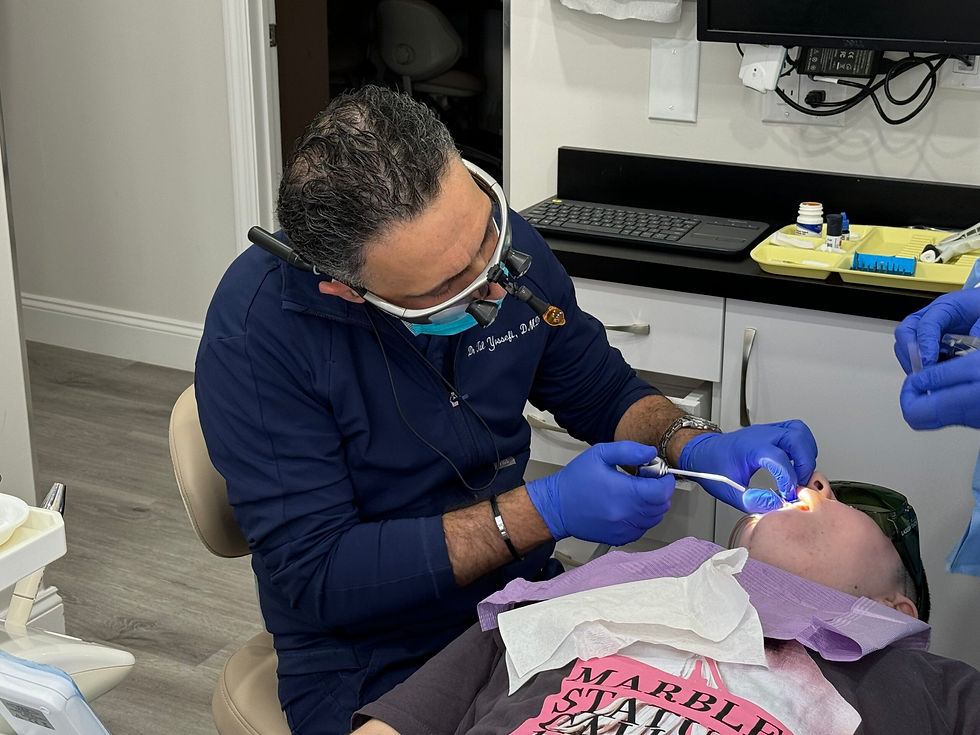Life-Changing Full Mouth Reconstruction: Patient Review of Upper and Lower Implants with Screw-Retai
- ADC Dentist

- Nov 27, 2023
- 3 min read
Updated: Nov 29, 2023
Confidence starts with a healthy smile. Full mouth reconstruction, also known as full mouth rehabilitation or full mouth restoration, is a comprehensive life-changing dental treatment that involves the restoration, enhancement, or reconstruction of all the teeth in the upper and lower jaws. As you can see in the case of our dear patient, he had a full mouth reconstruction with upper and lower implants supported by screw-retained restoration. It is a complex and customized dental procedure designed to address various dental and oral health issues and restore the smile’s functional and aesthetic aspects. Another beautiful smile is beyond expectations! Our patient is very happy with the results.
Full mouth reconstruction with dental implants is a transformative dental procedure that involves the replacement of most or all missing or severely damaged teeth with dental implants. Dental implants are artificial tooth roots made of biocompatible materials, such as titanium, which are surgically placed into the jawbone to provide a stable foundation for artificial teeth. This approach allows restoring function and aesthetics in cases of extensive tooth loss or damage.

The process begins with thoroughly evaluating your oral health, including X-rays, 3D scans, and clinical examinations. The assessment helps determine the extent of tooth loss, the condition of your jawbone, and any other dental issues that need to be addressed. If any remaining natural teeth need to be removed due to decay, damage, or gum disease, extractions are performed as part of the initial phase. Dental implants are surgically inserted into the jawbone. The number of implants needed varies based on individual requirements, but full-mouth reconstruction often involves placing multiple implants in both the upper and lower jaws. After implant placement, a healing period is allowed for osseointegration to occur. Osseointegration is when the implants fuse with the jawbone, providing stability and strength. Abutments, connector pieces, are attached to the implants once integrated with the jawbone. Abutments serve as the anchor for the final restorations. Custom-made prosthetic teeth (crowns, bridges, or implant-supported dentures) are fabricated to fit over the abutments. These restorations are designed to look and function like natural teeth. The final restorations are securely attached to the abutments, and your dental team ensures they fit comfortably, function properly, and provide an aesthetically pleasing result. After the full mouth reconstruction is complete, regular check-ups and maintenance are essential to monitor the health of the implants and the overall condition of your oral health. Maintaining good oral hygiene is crucial to the long-term success of your dental implants.
Full mouth reconstruction may be recommended for people with multiple dental problems affecting their ability to eat, speak, and smile comfortably.
These problems can be the result of various factors, including:
Tooth Loss: Extensive tooth loss due to decay, trauma, or gum disease.
Dental Trauma: Severe damage to teeth from accidents or injuries.
Severe Tooth Wear: Excessive tooth wear due to factors like teeth grinding (bruxism) or acid erosion.
Gum Disease: Advanced periodontal disease that affects the health of the gums and underlying bone.
Malocclusion: Bite problems such as overbites, underbites, and crossbites that impact jaw alignment and function.
Aesthetic Concerns: Aesthetic issues such as severe staining, discoloration, misalignment, or misshapen teeth affect a person's confidence and self-esteem.
Full mouth reconstruction in Advanced Dental Center typically involves a comprehensive evaluation and treatment planning. The treatment plan is tailored to the patient’s unique needs and may include a combination of the following procedures:
Dental Implants: To replace missing teeth with stable, natural-looking implants.
Crowns and Bridges: To restore damaged or missing teeth.
Dental veneers: To improve the appearance of discolored or misshapen teeth.
Orthodontics: To address bite and alignment issues.
Periodontal Treatments: To manage gum disease and improve gum health.
Endodontic Therapy: To treat infected or damaged tooth pulp.
TMJ Treatments: To address temporomandibular joint disorders.
Teeth Whitening: To enhance the aesthetic appearance of the teeth.
Dental Bonding: To repair minor aesthetic imperfections.
Full mouth reconstruction is a complex and lengthy process that requires careful planning. The goal is to improve the patient's oral health, function, and aesthetics, ultimately providing a more comfortable and confident smile. The specific treatments and timeline for a full mouth reconstruction will vary depending on your unique dental issues and goals. At our dental office, we understand that having a healthy and beautiful smile is essential.
For more information on full mouth reconstruction and other dental procedures, please call our office at (203) 945-0068 or contact us online. Schedule your consultation with the best dentists in Norwalk, CT!




Comments